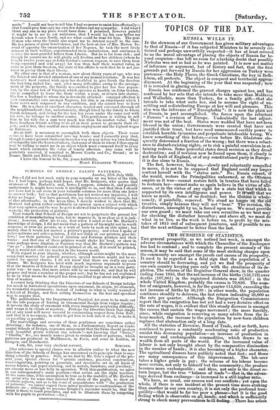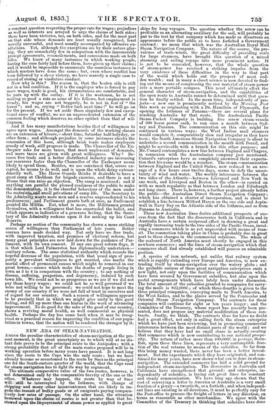THE SUNSHINE OF STATISTICS.
All the statistics of Revenue, Board of Trade, and so forth, have continued to prove a constantly accelerating ratio of production amidst this decreasing population—an increase of production in necessary and exchangeable commodities, which draws to -us wealth from all parts of the world. For the increased value, of labour is not only brought about by the comparative diminution in the number of hands ; it is also becoming of a higher character. The agricultural dinners have publicly noted that fact ; and there are many consequences of this improvement. The labourer takes a higher grade in pay; the returns of his labour become more certain, not only to himself but the community;_the produce becomes more exchangeable ; and .thus, not only is the direot re- turn larger, but the true " balance of trade "—that is.,,the,advan- tage derived from exchange—is increased in a still higher ratio. We have, as usual, our crosses and our.00nilicts ;: yet upon the whole, if there is one incident at the present time more striking than another in our own country, it is not only the profound tran- quillity—that would be far too poor a phrase but it is the good feeling which is observable on all, hands, and•which is sufficiently strong to check many provotfafivea .There has arisen
a constant question respecting the proper rate for wages ; prejudices as well as interests are arrayed to urge the claims of both sides ; there have been victories, too, on both sides, and for the most part on that side whose demands are least usually recognized, least usually successful, and most usually accompanied by offensive ex- ultations. Yet, although the exceptions are by their nature glar- ing, they are remarkably few in comparison with the innumerable prom pt agreements, reconcilements, and concessions made on both sides. We know of many instances in which working people, having the case fairly laid before them, have given up their claims ; anclit would be impossible to enumerate the countless instances in which masters have done the same ; but, even where conflict has been followed by a sheer victory, we have scarcely a single case to record of rioting or vindictive conduct.
NoW why is this ? The reason is, that the beaten side is still not in a bad condition. If it is the employer who is forced to pay more wages, trade is good, his circumstances are comfortable, and he puts up with the outlay. If it is the workman, he is not making so good a rate as some of his fellows, but employment is steady, his wages are not beggarly, he is not in fear of " the house"; and so, crying " Better luck next time !" he will go on for the present,. If we set aside those singularly few and excep- tional cases of conflict, we see an unprecedented extension of the common feeling which deserves no other epithet than that of wil- lingness. And it has many manifestations besides that of willingness to agree upon wages. Amongst the demands of the working classes are an extension of leisure,—short time, Saturday half-holyday, or other form ; and although prejudice in some instances checks the concession of this boon, although brisk trade makes employers greedy of work, still progress is made. The Chancellor of the Ex- chequer asks for more taxes, that most unpleasant of demands, and more taxes are given with great willingness. Why ? Be- cause free trade and a better distributed industry are increasing our resources faster than the Chancellor of the Exchequer seems likely to spend thern. Besides, we are convinced that, errors ex- cepted, he means to do well, and is upon the whole doing extraor- dinarily well. The Horse Guards thinks it desirable to have a great camp at Chaliam for brigade exercise, and there is not a Hume that can raise an.objection. The camp is mustered; and if anything can parallel the pleased readiness of the public to make the demoniitrgtion, it is the cheerful behaviour of the men under the restrain4,and small privations of camp life. The Secretary to the Admiralty wants more men and a reserve unprecedented to his prolecessors; .and Parliament grants both at once, as Parliament granted the Militia. But, what is more, the Militiamen granted themselves, with a willingness that has superseded the ballot, and which appears so indicative of a generous feeling, that the Secre- tary of the Admiralty reckons upon it for making up his Coast Reserve.
Perhaps no section of the community has shown a more striking access of willingness than Parliament of late years. Better courses have made decided way. Not only have we free trade, with improved taxation, and promises of electoral reform, but many great principles are now laid down for the guidance of Par- liament, with its own consent. If any one great reform flags, it is that which Lord Palmerston has diplomatically undertaken— sanitary reform. The same statistical authority which records the hopeful decrease of the population, with that usual sign of pros- perity a prevalent willingness to get married, also marks the mortal effect of permanent causes which might be removed in our great towns,—causes —causes which make the deaths of people living in town as 5 to 4 in comparison with the country ; to say nothing of disease, suffering, pauperism, and degeneracy, induced by such town life. We could not be so prosperous as we are if we did not pay those heavy wages; we could not be so well governed if we were not willing to be governed; we could not hope to meet the enemy of our country if we were not full of trust in ourselves and of regard for our country. Such a season of willingness appears to be precisely that in which we might give unity to this good feeling, and fill up more than one hiatus in the work of advancing improvement. To do good for the sake of the good of our country, shows a reviving moral health, as well commercial as physical health. Perhaps the day has come back when it may be recog- nized as a practical reason for improving the condition of our popu- lation in towns, that the nation will be rendered the stronger by it.



























 Previous page
Previous page